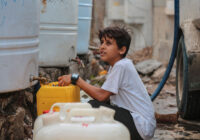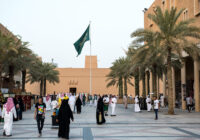Algeria’s leaders have yet to revamp the economic system to make the country globally competitive.
Economic news for Algeria, tied to its opaque political-business regimen, is hardly heartening. Despite the recent decree of yet another attempt at reform, the country remains stagnated within a system that inspires little confidence in international investors and drives away its talented youth looking for opportunities elsewhere.
Robert Looney, writing in Foreign Policy, argues that Algeria has done little to significantly change its business culture, characterized by an interlocking coterie of politicians and businesses that still regard foreign investment as a Trojan horse for breaking their stranglehold on the commercial life of the country. Worse still, Algeria “is perceived to be among the world’s 10 most corrupt.” Its indicators are all moving in the wrong direction as “Fiscal and trade deficits have shot up, international reserves are falling rapidly, and the currency has been devalued by nearly 30 percent.”
Similar negative outcomes are projected for gross domestic product (GDP) growth, which will end up around half of last year, largely due to the overreliance on all things hydrocarbon. Looney paints a damning picture. He asks: “Will the new strategy [New Economic Growth Model] be the stabilizing force the government needs? If Algerian history and international experience are any indication, the answer is no.”
He goes on to note that on critical indicators such as quality of governance, rule of law, control of corruption, government effectiveness and regulatory quality, it ranks below all of its North African neighbors. Algeria is unable to mobilize its population of 40 million, shrinking foreign reserves now around $150 billion, and proximity to Europe and Francophone African countries to take steps as its neighbor Morocco has done to implement a more sophisticated and open investment regime.
Looney mentions that there are “too many vested interests with a stake in blocking economic, social and political reforms have been created. Since it appears that the new reform plan was designed precisely by such vested interests in the corrupt government inner circle, it is unrealistic to expect the plan to set off a virtuous circle of reforms.”
Downward Trends in Algeria
Some indications of how far Algeria has yet to go were noted in an article in the Sada Journal. It says: “This new approach has failed to convince some Algerian economists, who insist the current system needs a wholesale transformation, including tackling the structural obstacles that deter foreign investors or the emergence of a dynamic private sector.”
This recommendation flows from the assumption that needed reforms—which would, among other steps, shift trade and investment responsibility to technocrats, free the financial and monetary system from its political albatross, provide transparency to contracting and commercial laws, and accept international accounting and banking standards—would be forthcoming. Not likely.
The basic structure of the economy, under the new model, like Saudi Arabia, is meant to move from its dependence on hydrocarbons to a more diversified economy. While the kingdom has Prince Mohammed bin Salman as the cheerleader-in-chief for Vision 2030, there is no comparable leadership in Algeria. It is ironic that it hosted the most recent meeting of the Organization of the Petroleum Exporting Countries (OPEC), which will only continue to make it difficult to wean itself away from hydrocarbons if the price of oil even incrementally rebounds, thus making it easy for the Algerian leadership to once again postpone needed reforms.
The latest figures from Algeria paint a very difficult situation ahead. According to BMI Research, using Algerian government sources, “Cuts in public spending, mainly affecting capital expenditure, and higher taxes and import duties will be negative for investment and consumption. While Algeria’s remaining fiscal buffers will help to delay a more dramatic fiscal and economic adjustment, the next few years are likely to see subdued growth and rising macroeconomic challenges.”
The problem with business as usual is broad and deep. For example, due to declining hydrocarbon exports, the trade deficit went from a $4.3 billion surplus in 2014 to a $13.7 billion deficit in 2015, with the rate continuing throughout 2016. As the BMI report points out: “With investment largely dependent on public spending, there are few other domestic sources to pick up the slack. Private investment has long been constrained by Algeria’s byzantine operating environment, marked by difficult access to credit and numerous regulations and time-consuming procedures.”
There can be little satisfaction in watching Algeria weaken itself by continuing to bring on its own debilitation by continuing to rely on inadequate assumptions for economic strategies. Even the agreement with China to build and run a new port project valued at some $3.5 billion will not alleviate the long-term consequences of failing to restructure and relaunch its economy based on a globally competitive series of assumptions that takes advantage of the keen human resources in the country.
The views expressed in this article are the author’s own and do not necessarily reflect Fair Observer’s editorial policy.
Photo Credit: Beyhanyazar
Support Fair Observer
We rely on your support for our independence, diversity and quality.
For more than 10 years, Fair Observer has been free, fair and independent. No billionaire owns us, no advertisers control us. We are a reader-supported nonprofit. Unlike many other publications, we keep our content free for readers regardless of where they live or whether they can afford to pay. We have no paywalls and no ads.
In the post-truth era of fake news, echo chambers and filter bubbles, we publish a plurality of perspectives from around the world. Anyone can publish with us, but everyone goes through a rigorous editorial process. So, you get fact-checked, well-reasoned content instead of noise.
We publish 2,500+ voices from 90+ countries. We also conduct education and training programs
on subjects ranging from digital media and journalism to writing and critical thinking. This
doesn’t come cheap. Servers, editors, trainers and web developers cost
money.
Please consider supporting us on a regular basis as a recurring donor or a
sustaining member.
Will you support FO’s journalism?
We rely on your support for our independence, diversity and quality.






